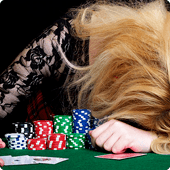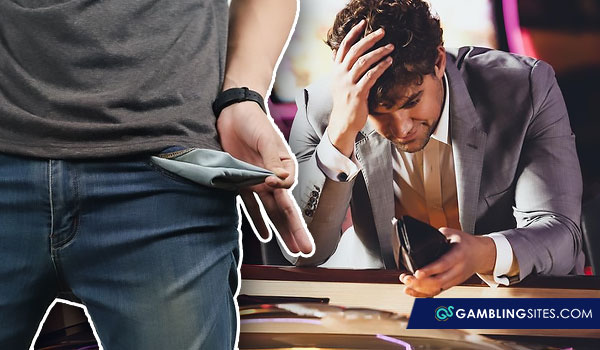Responsible Gambling Information
Problem gambling is a type of addiction characterized by compulsive behavior that interferes with an individual’s daily life, social relationships, finances, and mental health. It is often referred to as gambling addiction or pathological gambling. People with problem gambling have a strong urge to gamble, even if they know it is causing them harm. They often continue to gamble despite significant negative consequences such as financial problems, relationship problems, and emotional distress. It is a serious condition that requires professional help to overcome. The gambling problem in the US is more widespread than you may think. According to the National Council on Problem Gambling, approximately 2 million adults in the United States are subject to severe gambling problems on a yearly basis. While 4-6 million more demonstrate mild to moderate issues. These statistics highlight the need for further prevention efforts and access to treatment services. There is a positive side to things in that there are many resources available in every state and at the national level to support anyone with gambling addictions. There are also steps you can do yourself to help identify if you have a problem with gambling, as well as tips to try and avoid developing it.
Help for Those with a Gambling Problem
| Resource | Location | Website |
| Gamblers Anonymous | US | www.gamblersanonymous.org |
| The National Council on Problem Gambling | US | www.ncpgambling.org |
| GamCare | UK | www.gamcare.org.uk |
| Gamblers Anonymous UK | UK | www.gamblersanonymous.org.uk |
| Responsible Gambling Council | CAN | www.responsiblegambling.org |
| Gamblers Anonymous Australia | AUS | gaaustralia.org.au |
There is no shame in admitting that you have a gambling problem and that you need some help. There are millions of people all over the world who share this problem with you, and with the help of some experienced professionals, you have a better shot at trying to overcome it as quickly as possible than you would if you tried to do it alone. On a side note, every gambling site has an obligation to protect their customers if they feel that they have a gambling problem. Each site will approach this similarly. The three options include time out, account closure, and self-exclusion. A time-out is taking a break from your account. They can suspend it between 1 week to 6 months, depending on your preferences. The second option, account closure, is suspending your account for as long as you want, but you can reopen it at any time. The last option is called self-exclusion, which means that each site has to permanently ban your account for good if you ask their customer service team to do so. We highly recommend choosing one of these three options so that you can eliminate any temptation you might have to log in and play.
How to Identify That You Have a Gambling Problem

Gambling is meant to be a fun activity that is used to pass the time and cure boredom for a small price. Once it turns into something more serious than that, you might need to admit to yourself that you are developing a gambling problem. Sometimes you may not notice that it has become more serious until you have lost a lot of money. The Massachusetts Public Health Council offers a variety of personal stories from members of the community that share experiences of what has happened to them. For a lot of members in recovery, they reflect that it often started off with just wanting to spend $40 at the casino. But the rush they would get from it would lead to them spending more money than they had or borrowing it from loved ones and not being able to pay them back. The start of any successful recovery process begins by identifying the signs and symptoms of addiction. Only once individuals gain a complete understanding of their own addictive behavior can they begin to make progress in conquering their gambling addiction. There are a lot of telltale signs that might indicate your gambling problem could be getting serious, and being able to recognize them is an important step in recovery. The following list contains some of the bad habits that you should be looking out for:
- Gambling away important money such as rent money
- Thinking about gambling all day long
- Lying to others about your gambling habit
- Borrowing money from others just to gamble
- Gambling at stakes you know are too high for your bankroll
- Gambling to escape your problems while ignoring your responsibilities
- Gambling more to pay off a gambling debt
- Quitting your job or favorite hobbies to gamble
- Being physically unable to take breaks from gambling
- Spending less time with your family just to gamble more
If one or more of the items on the above list applies to you, then there is a high chance that you have a gambling problem. These signs are not present in normal people who just see gambling as a fun way to kill some of their spare time. An additional resource that could be helpful is from Gamblers Anonymous, which offers 20 questions indicating if you may be a compulsive gambler. Once you have identified the fact that you have a gambling problem, one of the best ways to fix it is to understand what causes this problem to begin with.
What Causes Problem Gambling?
It is important to know that addictions can happen to anyone, and it is not your fault if you develop one. But there are also some factors that come into play as to why some people develop gambling addictions and some don’t.
Biological Factors Influencing Gambling
The biological factors that impact gambling addiction are mainly related to changes in brain chemicals that affect decision-making, impulsivity, and mood. These changes may be caused by a combination of genetic, environmental, and psychological factors. Some of the brain chemicals that could be affected are dopamine and serotonin. Dopamine is directly connected to pleasure and reward centers in your brain. Individuals with gambling addictions likely have higher levels of dopamine in the brain. This may contribute to their tendency to engage in risky behaviors and their inability to control their impulses. On the other hand, serotonin is related to mood regulation, impulse control, and decision-making. Individuals with gambling addiction are more likely to have lower levels of serotonin. This may contribute to their mood swings, impulsive behaviors, and poor decision-making abilities. These biological factors can contribute to the development of gambling addiction by altering an individual’s brain chemistry and affecting their mood, impulsivity, and decision-making abilities. Understanding these factors can help in the development of effective treatments for gambling problems.
Psychological Influences on Gambling Problems

Psychological factors such as depression, anxiety, stress, or trauma can increase the risk of problem gambling. This is because gambling can be used as a coping mechanism for these negative emotions. People may turn to gambling as a way to escape and distract themselves from their problems, even if it is only temporary. However, this can lead to a cycle of addiction and make the underlying psychological issues worse. Depression and anxiety can also become worse from problem gambling, as losing money or becoming addicted can lead to feelings of hopelessness or worthlessness. This can also impact relationships and social functioning. It is important for individuals who are struggling with gambling addiction to address any underlying psychological issues in order to effectively treat the addiction. Seeking professional help, such as counseling or therapy, can be beneficial in addressing both the addiction and any co-occurring mental health issues.
Social Impacts on Gambling Problems
Social factors play a significant role in influencing individuals to gamble. Some of the main factors that contribute to problem gambling include peer pressure and access to gambling. Many individuals start gambling because their friends or family members are doing it. They might feel the need to fit in and conform to social norms. When their friends are gambling, they might feel like they should participate as well, particularly if they fear being left out or made fun of if they don’t. Another factor is easy access to gambling options, such as casinos, sports betting, and online gambling sites. Individuals who live near gambling venues, or those who have access to mobile devices and the internet, are more likely to gamble regularly. This can be hard to avoid because gambling is so accessible. That is why it is important to get help right away if you think you have a problem. Social factors play a crucial role in promoting gambling, and individuals must be aware of the potential risks associated with gambling. It is also essential for individuals to be mindful of their peers’ behavior and to avoid giving in to peer pressure.
Personal Aspects Contributing to Problem Gambling
In addition to biological, psychological, and social impacts, people can also develop problem gambling from personal factors. This refers to individuals’ characteristics or traits that may increase their likelihood of experiencing problem gambling. Some personal factors that have been found to contribute to gambling problems include a history of addiction, low self-esteem, and financial problems. People with a history of addiction, such as alcohol or drug abuse, are more likely to develop a gambling problem. We can see this from many of the stories shared by The Massachusetts Public Health Council. This is because addiction is known to be a compulsive behavior as well as an inability to control impulses, which can develop in excessive gambling.

As well as a history of addiction, another common personal factor is low self-esteem. People with low self-esteem may turn to gambling as a way to feel better about themselves or escape their problems. However, gambling can often make feelings of low self-worth worse whenever you lose and could lead to a cycle of dependence. Lastly, people who are experiencing financial difficulties or are struggling to make ends meet may turn to gambling as a way to make quick money. However, this can often lead to further financial problems, as gambling losses can quickly spiral out of control. These factors don’t necessarily lead directly to problem gambling on their own. But when they are combined with potential biological, psychological, or social impacts, people may be more likely to develop problematic gambling behaviors.
Myths and Misconceptions about Gambling
Another common contributing factor to developing problem gambling is believing common myths and misconceptions. People may incorrectly believe that they have control of their luck by engaging in rituals or favoring certain numbers. However, this type of thinking can lead to serious issues if taken too far. Some of the most common gambling myths include:
- Thinking that you will certainly win money
- Believing that you you will eventually win if you play long enough
- Choosing to keep playing until you win
- Thinking you can beat the house edge or gain an edge over the casino
The truth is that all forms of gambling include elements of chance, and there is no guarantee that you will win. In fact, the odds are usually against you. Some people do have lucky days or moments, but the house always wins in the long run. Many gamblers believe that they can turn their luck around if they keep playing long enough. Unfortunately, that is not how it works. The odds don’t change just because you’ve been on a losing streak. And the idea that you can recoup your losses by continuing to gamble is a recipe for disaster. That is why it is important to set a budget for yourself and stick to it. Some gambling problems are based on an innocent misunderstanding about the house edge and the nature of most casino games. A house edge is defined as a predictable long-term advantage in the house’s favor that is built into each game. You are not the house, and you do not have an edge. Therefore, you will lose in the long run. Simply misunderstanding this fact can cause a lot of confusion in some people’s minds, and it can lead them to develop a gambling problem. These people sometimes feel that they have a special system that can defy mathematics because they do not understand that mathematics governs the outcome of each game.
Tips for Gambling Responsibly
- Don’t gamble with money you need in the near future
- Don’t gamble with other people’s money
- Study the house edge for each game so you know what outcome to expect
- Don’t expect to win; accepting a loss and walking away is fine
- Think of your losses as a cost of entertainment
- Set time limits on your gambling sessions
- Set money limits on your gambling sessions
- Ban yourself from all gambling sites if you have a serious problem
- Try to have the maximum amount of fun per dollar that you spend
- Take week-long or month-long breaks from gambling sometimes
- Accept the fact that you will lose money; any other outcome is just a bonus
These tips are not guaranteed to fix your problem completely, but there is always the chance that looking at things from a different viewpoint or doing some extra research on the side will naturally help you with your gambling addiction.
Responsible Gambling Wrap-Up
More Resources
If you or someone you know is experiencing issues with problem gambling, there are many resources available to help. We’ve compiled a list of the most helpful responsible gambling resource and features below.
The National Council on Problem Gambling (NCPG) is a non-profit organization that connects those interested in reducing the effects of problem gambling with local resources. The organization operates 28 contact centers that cover all 50 states.
- Website: https://www.ncpgambling.org/help-treatment/
- Phone: 1-800-GAMBLER
- Live chat Link: https://www.ncpgambling.org/help-treatment/chat/
- Website: https://www.ncpgambling.org/help-treatment/
The Substance Abuse and Mental Health Services Administration (SAMHSA) has a free helpline that is available 24/7 to receive support for mental health disorders, including gambling problems. The service is provided both in English and Spanish.
- Website: https://www.samhsa.gov/
- Phone: 1-800-662-HELP (4357)
- Email: SAMHSAInfo@samhsa.hhs.gov
Gambler’s Anonymous is a fellowship of people that support each other as they seek to curb compulsive gambling habits. The organization follows the 12-step treatment principles set by Alcoholics Anonymous. All 50 states have Gambler’s Anonymous meetings that are available completely free of charge.
- Website: https://www.gamblersanonymous.org/ga/content/about-us
- Meeting Finder: https://www.gamblersanonymous.org/ga/locations
- Phone: 909-931-9056
- Email: isomain@gamblersanonymous.org
 75%
75% 80%
80%
 Latest UFC 317 Odds for Topuria vs. Oliveira and More
Latest UFC 317 Odds for Topuria vs. Oliveira and More  RANKED: The Best and Worst US States for Gamers in 2025
RANKED: The Best and Worst US States for Gamers in 2025  Deciding if Casino Bonuses Are Worth it at Online Casinos
Deciding if Casino Bonuses Are Worth it at Online Casinos  UFC 316 Betting Guide with Latest Odds and Top Picks
UFC 316 Betting Guide with Latest Odds and Top Picks